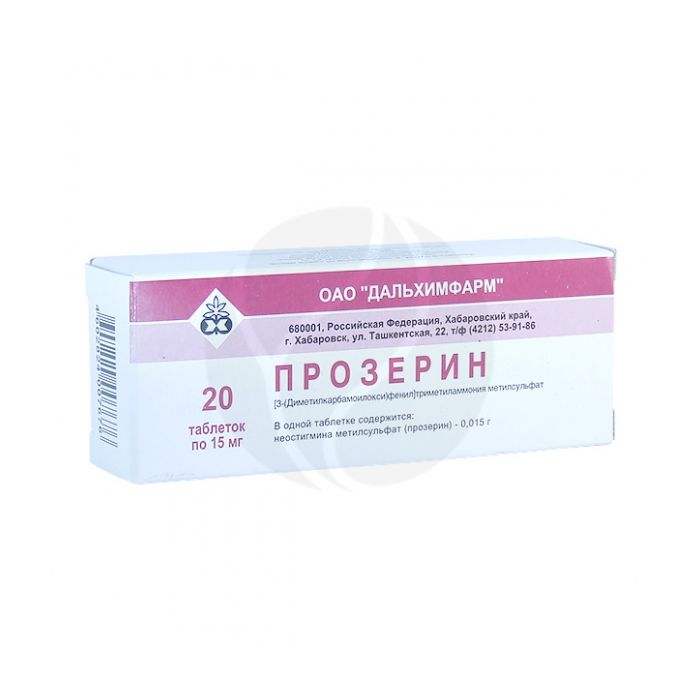Proserin tablets 15mg, No. 20
Expiration Date: 05/2027
Russian Pharmacy name:
Прозерин таблетки 15мг, №20
myasthenia gravis;
movement disorders after brain injury;
paralysis;
the recovery period after suffering from meningitis, poliomyelitis, encephalitis;
weakness of labor (rarely);
open-angle glaucoma;
neuritis, optic nerve atrophy;
gastrointestinal atony;
bladder atony;
elimination of residual disorders of neuromuscular transmission by non-depolarizing muscle relaxants.
In pediatric practice: myasthenia gravis, movement disorders after brain injury, paralysis, the recovery period after meningitis, poliomyelitis, encephalitis, neuritis, optic atrophy, gastrointestinal atony, bladder atony, elimination of residual disorders of neuromuscular transmission with non-depolarizing muscle relaxants.
Inside, 30 minutes before meals.
Adults - 10-15 mg 2-3 times a day, the maximum single dose is 15 mg, the maximum daily dose is 50 mg.
Children under 10 years old - 1 mg per 1 year of life per day, over 10 years old - up to 10 mg / day (no more).
The course of treatment (except for myasthenia gravis) is 25-30 days, if necessary - again, after 3-4 weeks. Most of the total daily dose is administered in the daytime when the patient is most tired.
With weakness of labor - 3 mg orally 4-6 times a day with an interval of 40 minutes.
| Pills | 1 tab. |
| active substance: | |
| neostigmine methyl sulfate | 15 mg |
| excipients: sucrose; potato starch; calcium stearate |
hypersensitivity;
epilepsy;
hyperkinesis;
vagotomy;
coronary heart disease;
bradycardia;
arrhythmias;
angina pectoris;
bronchial asthma;
severe atherosclerosis;
thyrotoxicosis;
peptic ulcer of the stomach and duodenum;
peritonitis;
mechanical obstruction of the gastrointestinal tract and urinary tract;
prostate adenoma;
period of acute illness;
intoxication in severely weakened children;
pregnancy;
lactation period.
Carefully. Against the background of anticholinergic drugs, in children (with myasthenia gravis) against the background of neomycin, streptomycin, kanamycin and other antibiotics with an antidepolarizing effect, local and some general anesthetics, antiarrhythmic drugs and a number of other drugs that interfere with cholinergic transmission.

